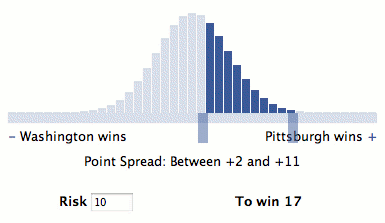The Kelly criteria is a money management strategy for gamblers and investors. The strategy says that, when faced with a positive-expectation bet, you should invest a fraction of your budget that is proportional to your expected profit. The more your expect to gain, the more you should risk, but you never risk your entire budget.
The Kelly strategy is optimal in several senses: (1) it minimizes your “doubling time”, or the time it takes to go from having X dollars to having 2X dollars; (2) it minimizes the time it takes to achieve any given level of wealth; (3) it maximizes your long-run wealth.
(It turns out that the Kelly strategy is equivalent to maximizing a logarithmic utility function.)
A key reason the Kelly strategy is optimal is that it is very careful to never take you completely bankrupt: you spend only a fraction of your money, always reserving a bit for tomorrow, however small. This is sound advice when dealing with real money. (Aside: this all assumes you have a strict budget cap, which is not entirely realistic: you can almost always borrow at least some amount, even in today’s economy.)
But what about maximizing your virtual “wealth” inside a play-money game like NewsFutures, InklingMarkets, HubDub, or MediaPredict? The problem is not quite the same, precisely because you cannot really go bankrupt. Almost every game offers an option to “recharge” your account if you go bust. Even if the option is not explicit, you can always just abandon your account and start a new one with a fresh initial bankroll they typically give to new players.
So what is the Kelly criteria for play money? What is the optimal strategy that minimizes your doubling time when you’re always allowed to recharge back to a fixed starting value any time you go bankrupt? The answer is not obvious to me, so I’m crowdsourcing the problem: can readers derive the right rule?
My only conjecture is that it might become optimal to go “all in” on every single bet. But I’m not sure. [Update: I’ve convinced myself this is not optimal. Imagine two sequential bets, the first with minuscule expected profit and the second with huge expected profit: surely you should not go “all in” on the first.]
Note that finding the optimal solution may not just help you win more bragging rights in online games. There is a fascinating sports betting site called CentSports that gives everyone ten real cents to start with. If you can turn that ten cents into twenty dollars, they’ll cut you a check. Moreover, if you ever go to zero, they’ll restore you right back to ten cents. In other words, the system works just like play-money games except the potential for profit is real. So another way to phrase the challenge question is: what strategy in CentSports minimizes the time it takes you to go from ten cents to twenty dollars?
